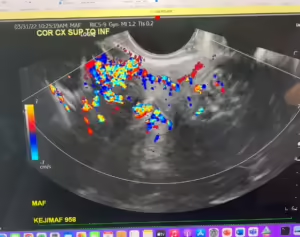I Was Ignored, Gaslit, and Nearly Lost My Uterus — Why Proactive, Whole-Person Care Is the Future
Proactive Care is the Key
I’ve been an entrepreneur for over 30 years—building businesses, solving problems, and leading teams. But nothing prepared me for navigating my own health crisis.
Years ago, my body started sending signals I couldn’t ignore—heavy bleeding, relentless fatigue, sharp pain, and a fog that dulled everything from my memory to my spirit.
Like most of us, I did what we’re told to do: I went to the doctor.
And I was met with dismissal.
“It’s just stress.”
“You’re a woman—that’s normal.”
“Let’s wait and see.”
Eventually, I was diagnosed with fibroids, a condition that affects up to 70–80% of women by menopause¹. The treatment options were narrow and invasive. The recommendation? “You need a hysterectomy.”
Losing my uterus—without a real conversation or being truly heard—felt like losing a piece of myself.
But this isn’t just my health story. It’s part of a bigger problem: a healthcare system that too often dismisses, overlooks, or treats symptoms without seeing the whole person.

The Epidemic of Reactive Healthcare: Why We’re Always Playing Catch-Up
Most of us know this experience too well: waiting until something breaks before we seek help. The doctor’s office becomes a triage center, where symptoms are treated in isolation, and chronic issues get bandaged rather than healed.
This reactive approach isn’t working for people, and certainly not for society.
We’re seeing skyrocketing rates of chronic illness, mental health struggles, burnout, and premature death. We’re treating symptoms, not causes. And when care is fragmented, people fall through the cracks, sometimes with devastating consequences.
But what if healthcare could be different? What if it was proactive instead of reactive? What if it recognized the full, complex human being instead of just a list of symptoms or lab results?
Why True Health Is More Than Biomarkers
I believe that health is more than perfect bloodwork or symptom-free living.
Biomarkers and diagnostics matter but if your labs look great and you’re miserable, disconnected, or lacking purpose, does it matter?
True health to me means balance with your body, mind, and spirit and feeling aligned with life purpose.
Meaning matters.

The Future Is Proactive, Purposeful, and Rooted in Whole-Person Care
My health journey could have ended in silence, resignation, and surgery.
Instead, it became a catalyst—for me, my friends, and everyone who’s ever been told, “You’re fine,” when they knew they weren’t.
I created Rêve Health with Madeline Cunningham to honor the body as part of nature, connected to mind, spirit, and environment.
We see health as a dynamic balance, not a checklist of symptoms. Our approach integrates ancient wisdom and modern science to create personalized pathways that support your unique journey—not just managing illness, but fostering vitality, purpose, and resilience.
Regardless of whether you use our services, I think it’s important to know that you have the power to change your health, get the answers you need, and look beyond reactive care.
Just because things have always been done one way certainly does NOT mean that will always be the way.
Every day, more companies pop up that give you access to screening, biomarker tests, and full-body, integrative health. The new full-body screeners are great first-level diagnostic tools. In time, the cost for these scanners and protocols–even those from my startup–will go down.
Proactive health will become more accessible because people are demanding it.
You really, really do have the power to change your health, and your life.
Sources
📚 Sources
Baird, D. D., Dunson, D. B., et al. (2003). High cumulative incidence of uterine leiomyoma in black and white women: Ultrasound evidence. American Journal of Obstetrics and Gynecology.
NIH / Eunice Kennedy Shriver National Institute of Child Health and Human Development. (2021). Uterine fibroids. https://www.nichd.nih.gov
Hamberg, K., Risberg, G., et al. (2004). Gender bias in physicians’ management of neck pain. Journal of Women’s Health.
KFF Women’s Health Survey (2022). https://www.kff.org


